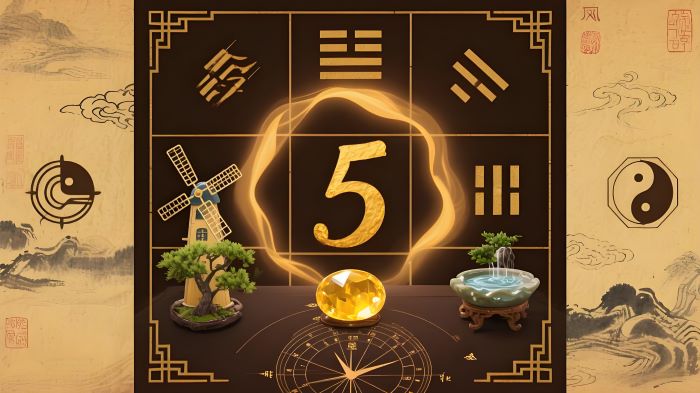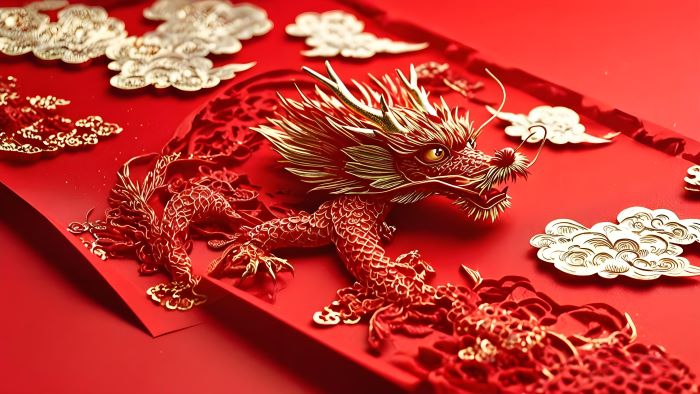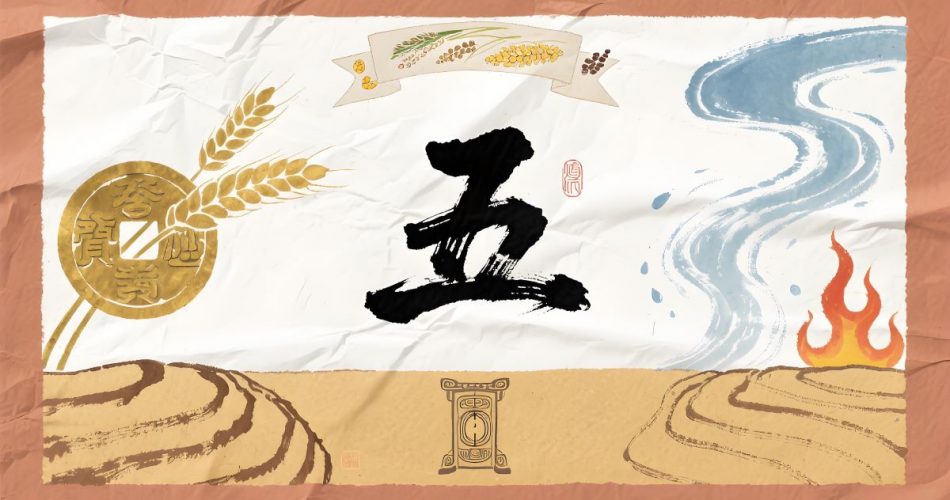In Chinese culture, numbers often have profound symbolic significance and play a role that goes beyond their numerical value. Among them, the number 5, as an important number, has rich connotations and symbols.
- The Number 5 and the Chinese Character "五"
- The Number 5 and the Chinese Character “伍”
- Is the Number 5 a Lucky Number?
- The Number 5 in Fengshui (Geomancy)
- The Significance of the Number 5 in Chinese Zodiacs
- The Number 5 in the Book of Changes
- The Character “五” in Buddhism
- The Meaning of the Character “五” in Taoism
- The Significance of the Number 5 in Chinese Medicine
- The Number 5 in Romance
- The Meaning of 5 in Homophones
- The Extended Meanings of the Number 5 Online
- Can I Make the Number 5 My Lucky Number?
The Number 5 and the Chinese Character “五”
“五“ is the Chinese character for the number 5, pronounced “wǔ” in pinyin.
There is an extremely broad and profound significance of the character “五”. It is said that the cultural meanings of the character “五” cover the Chinese traditional culture, becoming an important pillar in the Chinese traditional culture.
The Chinese character “五” (wǔ), meaning “five,” first appeared in oracle bone inscriptions. In its earliest usage, it denoted a fundamental numerical concept that later came to symbolize key elements that constitute the universe.
Over time, this notion evolved into the cosmological theory known as the “Five Elements” (wood, fire, earth, metal, and water). First formally recorded in the Book of Documents, this theory proposed that these five essential forces governed the natural order and the dynamic balance between heaven and earth.
According to this theory, ancient wise people believed that the universe was composed of five basic substances: wood, fire, earth, gold, and water. These five elements are closely related to the fate of human society and the changes in the natural universe.
Besides, there are many sayings about the Chinese character “五”. For instance, there are five cardinal virtues: benevolence, justice, propriety, wisdom, and honor.
The “Five Mountains” refer to Mount Taishan in the east, Huashan in the west, Hengshan in the south, Hengshan in the north, and Songshan in the middle.
The “five types of grain” refer to rice, millet, millet, wheat, and beans. Five organs are heart, liver, spleen, lung, and kidney.
The “Five Righteousness” refers to father’s righteousness, mother’s kindness, brothers and friends, brother’s respect, and filial piety.
The five-system hierarchy classification of human beings is bestowed by heaven, and the spiritual efficacy and effectiveness of the “五” seem to be influenced by the gods, formed by creation, and unify the order of existence in the universe and life.
Besides, the mysterious power of the character “五” also extended from the palace to the countryside.
There is a folk custom of wrapping “five-colored silk” during the Dragon Boat Festival. Legend has it that the five colored silk symbolizes the five-colored dragon, which is worn on the body and has the effect of dispelling evil and avoiding plague.
In Origin of Chinese Characters complied by Xu Shen in the Eastern Han dynasty, the number 5 represents how Yin and Yang intersect between heaven and earth at noon, and it is later extended to one of the phonetic names in the ancient military organization unit and Gongchi notation.
There are many Chinese traditions associated with the character “五”, shaping the colorful Chinese culture.
The Number 5 and the Chinese Character “伍”
The number 5 is a key number in the Arabic numeral system, while the Chinese character “伍” is the traditional representation of quantity in Chinese.
In terms of quantity, the relationship between the number 5 and the Chinese character “伍” corresponds to each other. However, in terms of connotation, the Chinese character “伍” has richer connotations than the number 5.
The Chinese character “伍” can be used not only for counting and calculation, but also to represent the fifth in order, such as “fifth grade” and “fifth class”.
“伍” is the capital writing of “五”. The “五”in “伍” represents quantity, and the “亻”on the left represents people, so “伍” also means a small collective composed of five people.
Is the Number 5 a Lucky Number?
Yes, 5 is associated with positive symbols such as auspiciousness, luck, and prosperity in many Chinese traditions and customs. Therefore, it is a very auspicious number.
In Chinese culture, the ancients believed that the Five is a code that combines various relationships between the Big Universe and the Small Universe, such as the Five Directions (south, north, east, west and center), Five Internal Organs (liver, heart, spleen, lung, and kidney), Five Elements (metal, wood, water, fire and earth), and Five Precepts (to abstain from killing, stealing, sexual misconduct, lying and intoxication).
In the Luoyang diagram symbolizing the energy of heaven and earth, the Five Dwellings at the center are called the Heart Accommodation.
Heart Accommodation, also known as Mingtang, is the political palace of the Heavenly King in Chinese mythology. The Heart Accommodation is often used in ancient architecture and decorative art as a symbol of auspiciousness.
In addition, in ancient times, there was the saying that “the number nine and five represents the supremacy of the emperor”, which means that five is a number that can govern heaven and earth, representing a symbol of power and status.
The Number 5 in Fengshui (Geomancy)

In the layout of Fengshui, the position of the number 5 is often regarded as the key center point. The flow and balance of its energy play an important role in the overall Feng Shui pattern.
Therefore, the emergence of the Xun hexagram can help people better grasp and seize opportunities and achieve their goals.
At the same time, with the help of Xun hexagram, people can enhance their confidence and courage, improve their thinking ability and creativity, thus better coping with the challenges in life.
The Significance of the Number 5 in Chinese Zodiacs

According to the traditional Chinese zodiac system of 12 branches, the corresponding zodiac sign for the fifth zodiac is the Dragon.
Dragon is regarded in China as a symbol of nobility and holiness, lofty aspirations, flexibility, and openness, with auspicious meanings of punishing evil and suppressing evil, and promoting national prosperity and people’s peace.
In addition, dragons are also endowed with various auspicious meanings, such as the leaping of dragons and tigers, the spirit of dragons and horses, and the auspiciousness of dragons and phoenixes, which deliver people’s expectations and wishes for a better future.
The Number 5 in the Book of Changes
In the Book of Changes, the number 5 is associated with the five elements and is regarded as the beginning of heaven and earth.
In the Book of Changes, 5 (“五”) are unified, encompassing everything and corresponding to the universe; Congenitally easy to count, with one as the largest; The day after tomorrow is easy to count, only 5 (“五”) are honored.”
This indicates that the number 5 contains the principle of balance between all things in the world, representing a state of natural balance completely maintained by the laws of the object itself.
Therefore, the number 5 is often regarded as a symbol of auspiciousness, containing various beautiful meanings such as wealth, longevity, health, prosperity, and reputation.
It is believed that the number 5 can bring good luck, happiness, and success. In some traditional customs, the number 5 is also used to ward off evil spirits, pray for blessings, and ensure peace.
The Character “五” in Buddhism
In Buddhism, 5 has various special meanings.
5 (the character “五”) represents the five aggregates, namely, color, perception, thought, action, and realization. This is a description of the five basic elements of human existence in Buddhism, representing the human body, feelings, thoughts, behaviors, and consciousness.
Buddhist teachings emphasize the suffering, emptiness, and impermanence of human beings, and the theory of the five aggregates helps Buddhists understand the essence of human existence and the truth of the world.
Through in-depth observation and insight into the five aggregates, people can transcend the constraints of the secular world, achieve a deeper understanding of life, thus moving towards a state of liberation and enlightenment.
The Meaning of the Character “五” in Taoism
In the theory and practice of Taoism, the mystery of the character “五” has been fully utilized.
According to Taoism, the Qi (气) generated by the Five Elements is called “Five Buds”, allowing believers to consume this kind of Qi from heaven and earth to nourish the five internal organs and achieve the goal of promoting deity and immortality and prolonging life.
In addition, Taoism also has the “Five Directions”, namely East, West, South, North, and Central. Each orientation represents different energies and forces, closely related to the operation and balance of the universe.
The “five types of grain” refer to rice, millet, millet, wheat, and beans, symbolizing harvest, health preservation, and harmony between humans and nature.
The “Five Blessings” refer to longevity, wealth, nobility, health, and goodness, symbolizing people’s desire to pursue happiness, health, and prosperity.
The Significance of the Number 5 in Chinese Medicine
The number 5 is closely related to various aspects of human physiological structure, balance, and function, as well as physical health in traditional Chinese medicine.
In terms of the organizational structure of organisms, the expression of spiritual and emotional activities, and the secretion of human body fluids, there are known as the “Five Organs”, “Five Bodies”, “Five Emotions” (joy, anger, sorrow, anxiety, fear), and “Five Kinds of Secretions” (Sweat, tears, and saliva).
Among them, the five internal organs show that the mind is happy, the liver is angry, the spleen is thinking, the lung is sad, and the kidney is fearful.
The five organs correspond to the five fluids, namely sweat in the heart, mucus in the lungs, tears in the liver, saliva in the spleen, and saliva in the kidneys.
The five bodies are in harmony with the five organs, namely the liver matches tendons, the heart matches veins, the spleen matches flesh, the lung matches skin, and the kidney matches bone.
Beyond that, there are also “five flavors” and “five colors” in terms of color, taste, and character categories of medicine.
The Number 5 in Romance
In romantic love, the number 5 is endowed with extremely unique meanings, and it symbolizes the meaning of “perfectness”.
The number 5 or the Chinese character “五” represents the five key elements required for love, namely, trust, communication, respect, care, and tolerance. These five elements are essential for establishing stable and long-term romantic relationships.
This number represents the closely associated fate between two persons who can only grow together with mutual support and understanding.
What’s more, the number 5 or the Chinese character “五” also represents the middle ground. In love, balance is crucial. Whether it’s the care and support of both parties or the lifestyle habits and personalities of the two people, it’s necessary to find a balance. Only in this way can we ensure the long-term maintenance of love.
The Meaning of 5 in Homophones
In Chinese homophones, the pronunciation of the number 5 is similar to “无事” (none of my business) and “无忧” (being away from concerns).
Furthermore, the homophonic sound of the number 5 is the same as “ I”, so when expressing emotions, people often use the number 5 to match other numbers to express love. For example, 521 and 520 represent “I love you” (“我爱你”).
The Extended Meanings of the Number 5 Online
The number 5 also extends to other meanings online. For example, on the internet, the number 5 can also represent “wu” (“呜” in Chinese), which carries the meanings of crying and sadness.
Can I Make the Number 5 My Lucky Number?
Of course, you can! If you think that the number 5 is special for you, or if you feel that things related to the number 5 bring good luck in different situations, you can consider it as your Chinese lucky number.
However, if you don’t know what your lucky number is, you can try the following methods:
1. By your instincts: If you see a certain number multiple times in a certain time, place, or event, and your intuition or experience makes you very fond of it, you can consider this number as your lucky number.
2. Searching based on constellation: If you know your zodiac sign, you can find your lucky number by querying the correspondence between the zodiac sign and the number. For example, the number for Aries is 1, for Taurus is 2, for Gemini is 3, and so on. In this way, you can find your lucky number.
In Chinese culture, the number 5 is not only a mathematical concept, but also a symbol with profound meaning from the Five Elements, Five Organs, Five Constants, to the Five Blessings, from the structure of the universe to the circumstances of life.
Through this number, we can glimpse the Chinese people’s contemplation and exploration of the cosmic order, ethics and morality, and philosophy of life.
It is a symbol and a window to the essence of Chinese culture, leading us to deeply explore the ancient and rich wisdom of China.
